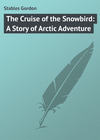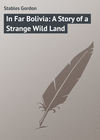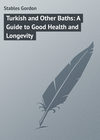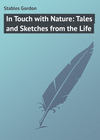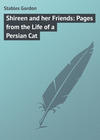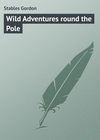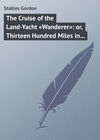Kitabı oku: «The Cruise of the Snowbird: A Story of Arctic Adventure», sayfa 11
Chapter Sixteen
Old Seth Becomes Surgeon – A Terrible Danger – Ralph Floods the Magazine – Fighting the Fire – Wreck of the “Trefoil” – Buried at Sea – “Land Ho!”
The second mate had been left in charge of the Trefoil when the boats left the vessel to go in pursuit of the whale. How sadly that pursuit ended the reader has already been told. Besides this officer, when the fire broke out there were only on board the cook, the steward, and three or four ordinary seamen. Smoke was first seen issuing from the fore hold, and, whether for good or for bad, the mate at once ordered the hatches to be battened down, then he hoisted the boat’s recall, and commenced firing minute-guns as a signal of distress.
It had been a race for wealth with the Trefoil’s boats when leaving her. As they sped back again to their burning ship it was a race for life itself, or at all events for all they held dear in life. Yonder, with the smoke hanging like a dark and ominous cloud over her forecastle, and rolling slowly upwards hiding yards and shrouds, was their home upon the waters, the good ship in which they had sailed from England more than a year ago. If anything were to happen to her, how were they ever to reach their native shores, where wives and children, fathers, mothers, and sisters, were even now pining for the return of the absent sailors?
The bold, straightforward character of McBain was never so well seen as in times of emergency and danger, and then, too, the goodness of the man’s heart shone forth. Our heroes’ boat was among the first, if not the first, to render assistance, after the terrible wreck of the captain’s whale-boat, as described in the last chapter; and as soon as it was discovered that the Trefoil was on fire, McBain had an interview with the mate.
“A burning ship,” he said, “is no place, sir, to convey wounded men to, nor dead either. Place them in my boat, they will receive every attention on board our little craft. Meanwhile, you speed away to your ship, and presently we will follow you, bringing to your assistance all the men we can spare from the Snowbird.”
“God bless you, sir!” said the mate, much affected. “What a blessing that your vessel was here! It shows me that He has not altogether deserted us, bad though our fortunes have been.”
Out of the crew of the lost whale-boat, numbering eight in all, including the harpooner, the captain himself, and the coxswain, only three escaped intact, while three were killed outright, and the remaining two badly hurt, one having both bones of a leg broken, the other sustaining a grievous wound in the forearm. In solemn silence, and with all due respect, the captain and his two brave fellows who had lost their lives were laid side by side on the quarter-deck, and their bodies covered over with the Union Jack – the sailors’ pall, for surely it is meet and proper that the flag a man sails or fights under while alive shall cover his poor body when life has fled, and ere yet it is committed to the cold, dark, fathomless ocean.
The wounded men were carried below, and placed in comfortable cots between decks.
“I daresay,” said McBain, “my duty for a time will keep me here by these two poor fellows, though I would like to be hastening away to the assistance of that unhappy ship.”
“Nary a duty, sir,” said trapper Seth.
McBain looked up. Here was this tall, ungainly Yankee, with the lantern jaws and the iron fists, standing forth in quite a new light, namely, that of surgeon. He had stripped off coat and waistcoat and rolled up his sleeves. Beside him stood little Magnus, holding in his two hands a basin of warm water, in which a sponge floated, holding under his arm a bundle of hastily-manufactured bandages.
“Nary a duty!” repeated Seth. “I guess you’d better leave the wounded to the care of the two old ’uns here. Seth has done up more cuts and skivers in his time, than there are days in leap year. As for the broken leg, we’ll soon cooper that, won’t we, Magnus?”
“That will we!” Magnus replied, cheerfully.
Nothing loth to be relieved of a somewhat unpleasant duty, McBain at once called for volunteers, and was considerably surprised to be almost immediately surrounded by every man in the ship except the man at the wheel.
“I didn’t pipe all hands,” he said, with a quiet smile.
However, he picked out twelve of the sturdiest of his fellows, and with these in the cutter – he himself holding the tiller – he was soon alongside the Trefoil.
The pumps had been already manned and the hoses rigged, and two lines of men were ranged along the decks, drawing water in buckets from the starboard and port sides. The smoke was spewing up the forehatch, the decks were wet and slippery, and the men, stripped to the waist with the exception of their guernseys, were working away with such a will that the perspiration stood in beads on their arms, and trickled down their smoke-begrimed faces.
Something like a cheer arose when our heroes and their volunteers sprang on deck, and at once set about preparations for work. McBain beckoned the mate aft, and a consultation was held, at which Rory, Ralph, and Allan were present.
Very much to his surprise, the captain of the Snowbird speedily discovered that the mate of the Trefoil had completely lost his head, as the saying is.
“This is a bad business, sir,” McBain began. “Oh, it is dreadful – it is fearful!” cried the mate; “it is – it is – whatever shall we do?”
“We’ll keep cool to begin with,” said McBain; “nothing is to be gained by hurry or excitement. Tell me this: How did the fire originate?”
The mate gave him a strange glance. “It is not for me to guess even,” he said. “There is one, perhaps, on board who could tell you.”
“Then where did it originate?”
“Ah! that I can tell you,” said the mate. “Among the coals – under the galley in the hold. The fire is confined to that place now; but look you, sir! smashed up among those coals are the bodies of six pigs that we took out with us. For warmth on the voyage out they buried themselves among the coals, and were killed by the roll of the ship. Their bodies are, we know, cut into piecemeal and intimately mixed with the coals. No wonder they burn!”
“But you are simply pouring water into the ’tween decks,” said McBain; “you’re not even sure if it be reaching the fire.”
“I didn’t think of that,” said the poor confused mate. “But,” he continued, “there is worse to tell you!”
“Go on, and quickly!” cried McBain. “What is the worse?”
The mate’s reply was gasped out rather than spoken, and he turned as pale as death as he uttered the words.
“The magazine is not flooded, and it is close to where the fire is raging!”
The blood sprang to McBain’s cheek, the fire seemed to flash from his eye, as he brought his fist down with a ringing crash upon the hatchway, near which he stood.
“What sinful folly!” he cried. “Call for volunteers at once. Call for volunteers, I say, and flood your magazine, man!”
“Stay!” said the mate, now fully aroused, and regaining a little common sense – “stay! You little know my men; they are not picked Englishmen like yours, they are principally stevedores and fishermen. Did they know the magazine was not flooded it would be sauve qui peut. They’d take to the boats and leave the Trefoil to her fate. I have myself been down below, and had to be dragged up through the smoke, fainting. Besides, it needs two hands, and I’ve no one to trust.”
“But the danger is imminent; we may all be blown to pieces without a moment’s warning,” said McBain.
“See here, mate!”
It was Ralph who spoke – brave, quiet, English Ralph – and bravely and quietly did he speak, while his comrades looked on astonished. Courageous they all knew he was, in a fine old lazy Saxon fashion; but to see him stand forth in the hour of need, six feet and over of brawny stalwart heroism, ready and willing to lead a forlorn hope, took his friends aback.
“See here, mate. I’ll go with you to flood the magazine. If it’s only the smoke you fear, I know how to steer clear of that. I was at the burning of Castle Bryn Mawr, and gained an experience there that will last me a lifetime. Come below with me quickly. Now get me towels and a basin of water. Thanks! now watch what I do. Your handkerchief, Rory; yours, Allan. See here now – with this tiny pair of scissors I first cut two small eyeholes in the towel. Then I wet it in the water. Now I tear a handkerchief in two, and wet the parts and fold them into pads. Sit down, mate, sit down. One little pad I place at each side of the nose, the towel I bind firmly round the head and fasten behind. Now, mate, you can only breathe through the wet towel, and no smoke can harm you. Now, boys, here is the other wet towel and the pads, do the same by me.”
In less time than it has taken me to describe them, these simple operations were completed, and next minute Ralph was stepping manfully forward to the forehatch, followed by the mate.
The latter seized the hose with his left hand, and took Ralph’s left hand in his own right. He could thus guide him, for the mate knew where the magazine lay, but Ralph could not. Then they disappeared.
The bucket-men had, at the mate’s orders, ceased to work for a time, and took their turn at the pumps to relieve the others. They stood quietly with their backs to the bulwarks and with folded arms. Something they knew was being done below – something connected with the safety of the ship, and they were content.
Minutes, long minutes of terrible suspense to McBain and his two boys, went slowly, slowly by. Rory, who was passionately fond of Ralph, thought the time would never end, and all kinds of horrible fancies kept creeping into his mind. But look – they come at last; the heroes come. They stagger to where their friends are standing, and Rory notices that Ralph’s hands are sadly blackened, and that his finger-nails drip blood. It had been trying work. The magazine lid had fouled, and it took them fully five minutes to wrench it off, and five minutes more to flood the compartment. But it is done at last, and safety, for a time at least, is insured.
And now to fight the fire, to flood the hold, without admitting too much air to feed the flames.
McBain’s proposal was carried unanimously. It was to scuttle the lower deck, and fasten into the hole so made, the end of the long copper ventilator which stood between the fore and the main masts, and was used for giving access to air into the men’s living and sleeping rooms.
Ralph determined to go down again, and could not be restrained from doing so. His work, he averred, was but half finished; the mate and he between them could scuttle the deck with adzes and axes, and fix the funnel-shaped ventilator, in a quarter of an hour. They were too anxious to stop long for refreshment. Only a draught of water, and seizing their implements, down they went once more.
So perfect were the simple face-guards they wore, that they might have stopped below until the work was completed, had it not been necessary to come on deck to have them removed and re-rinsed in clean water. Happily the fire was not raging immediately beneath the spot where they cut the hole, or the flames might have defied all their efforts to fix the copper funnel. It was no easy task to do so as it was, for the smoke rolled up in blinding volumes, and the heat was intense. But they finished the work nevertheless, and finished it well, carefully surrounding the end of the ventilator with wet swabs.
With pumps and with buckets the water was now poured down the communication thus effected with the hold, and surely men never worked harder for dear life itself than did the crew of the Trefoil and the Snowbird volunteers, to save that burning ship. The danger was very urgent, for if the water were not constantly kept pouring down in volumes the heat must soon melt the end of the ventilator, and the fire gain access to the ’tween decks.
At first volumes of sparks flew upwards, and it was feared this might fire the sails. Hands were told off, therefore, to clew them. Then came volumes of dense smoke only, and this for a whole hour without abatement; but gradually the smoke grew less and the steam more.
Gradually the ’tween decks cleared of smoke; and ere long steam alone, and but little of that, came up the ventilator. Then they knew the fire was mastered, that the danger was past.
McBain parted that evening from the mate, now master of the Trefoil, with the promise that the Snowbird would keep near his barque for a day or two at least, until the chance of the fire once more breaking out was no longer to be dreaded. Although the sun sets every night, even at midsummer time, in the latitude in which the yacht was now sailing, there is very little darkness, only just a few hours of what might be called a deepened twilight, then day again.
The breeze had freshened. Just before turning in for good, our heroes noticed they were approaching a stream of somewhat heavy ice. They were but little alarmed at this, however; they were used to the sight of ice by this time, and could sleep through the din of “boring” through fields of it.
“I’m glad the wind keeps strong, Stevenson,” McBain said, previously to going below. “Keep her stem-on to the big pieces, and don’t bump her amidships, if possible. Call me if anything unusual occurs.”
It was precisely three bells in the middle watch when the mate entered Captain McBain’s room.
“Well, Stevenson,” said McBain, sitting up in bed, for he was a light sleeper; “we’re clear of the ice, I suppose?”
“Yes, sir,” said Stevenson. “We’re in open water. We’re dodging, sir. I’ve hauled the foreyard aback, to wait for the Trefoil.”
“She’s in sight, then, of course?” asked McBain.
“No, sir, that is the curious part of it. I can’t see a sign of her; not a vestige, even from the crow’s-nest.”
“What?” cried McBain.
“It is true, sir,” continued the mate. “We were both working through the ice-stream just before darkling. I was too busy to look much about me till we got outside; then I missed her. There are two or three large bergs among the smaller. She may be hidden by one of these. If she isn’t I greatly fear, sir, something has happened to her.”
The captain was on deck in a few minutes, and found the mate’s words were sadly true.
He tacked up and down for hours, so as to see both sides of every large berg in the stream, but no Trefoil was there. She was gone. Never more would this goodly barque sail the northern seas.
Towards noon that day one solitary boat was seen to emerge from the bergs of the ice-stream, and begin advancing towards the Snowbird. One boat – eleven men and the first mate – were all the survivors of the ill-fated ship. She had been struck amidships. A three-cornered piece of ice had gone half-way through her, then receded, and in three minutes’ time she had filled and gone down, the mate and the watch on deck having barely time to cut a boat away.
(The same fate befell the Innuit, of Peterhead, some fifteen years ago; she went down in the short darkling of a summer’s night, a very few minutes after being struck. She had been lying beset, with my own ship and several others, in an ice-pack, to the south-west of Jan Mayen. The hands, however, were saved. —The Author.)
That day, after dinner, the mate told the short but sad history of the Trefoil’s cruise.
“The same captain was in her,” he said, “for three years, and never yet succeeded in getting a paying voyage. His owners weren’t pleased, you may be well sure. Unscrupulous men they are, every one of them. They told him, and they told me and our second mate, before we left England last, that if we were a clean ship this voyage they would rather never see the ‘Trefoil’ again! We knew what that meant. We knew the Trefoil was heavily insured. But the captain was a gentleman; he would have died sooner than harm a timber of the dear old Trefoil. But the second mate – ah! it is wrong, I know, to speak ill of the dead, but I have reasons, strong reasons, for believing that it was he who fired the ship.
“We had bad luck last summer; we never struck a fish. Then we got beset among such terrible ice as I had never seen before, and there we had to winter. There was another ship not far off in the same predicament, though she lay on an evener keel.
“It was because our poor captain was so unhappy that, during the winter, he began to acquire sadly intemperate habits. We could not see him dying by inches before our faces; we loved the man, and tried to save him. We mutinied – ay! it was mutiny, but if ever mutiny was excusable it was in this case. We marched aft and seized the keys of the room where the grog was stored, and, with the exception of a few gallons, which we kept for the spring fishing, we poured every drop down the ice-hole. Two weeks after that the captain sent for me and thanked me before the men for what I had done. You know the rest of our story, gentlemen.”
Next morning it had fallen calm again; the sky was of a deeply azure blue, the sea a sea of glass, with one or two beautiful Arctic birds floating lazily on its surface. And thus lazily floated the good yacht Snowbird, rising and falling on the gentle swell. All hands were aft at an early hour listening to the solemn words of the Burial Service. The bodies had been sewn in hammocks and weighted with portions of iron, and at the words, “Earth to earth, dust to dust,” the flag was quietly withdrawn, the grating on which they lay was tilted, and, one by one, they were allowed to drop into the depths of that dark mysterious ocean, where shall repose the bodies of so many of England’s bravest sons, till the sea gives up its dead.
By noon the glassy surface of the water was touched here and there by what sailors term “cat’s-paws.” Half-an-hour later the sea was all of a ripple; then the Snowbird’s sails filled again, and she bore away to the west. And so west and west she went for several weeks, only altering her course at times to avoid the heavier ice, or when compelled to do so by a change of wind. Then for days and days they kept nearly south and by west, till one morning there was a shout from the mast-head that thrilled every heart with joy, —
“Land ho!”
Chapter Seventeen
On Shore for a Run – Noontide on the Seashore – A Natural Harbour – The Land of Adventure and Sport – After the Antelope – Face to Face with a Grizzly
Yes, yonder lay the land. A mere cloud-land as yet, though; a long streak of darkish blue, higher at some places than at others, and running all along one half of the southern horizon. There was much speculation on board as to what the country they were approaching would turn out to be, whether or not they would find inhabitants in it, and what their reception would be, what their adventures, and what their chance of sport. Judging from his latitude and longitude McBain put it down as some portion of the northern shores of British America, and old Seth “guessed” and “calculated” that if there were any inhabitants they would be “blueskin Injuns,” and they would have to make a welcome for themselves if they wanted one.
Before many hours were over, however, they had sailed near enough to scan the coast with their glasses. The foreshore was low and rocky; beyond that was a wilderness of wood and forest as far as the eye could reach, but no signs of smoke, no signs of human life. Everything seemed as peaceful and still as though it were a world newly evolved from the hands of its Creator.
“I’m very much mistaken,” said McBain, “if this isn’t just the kind of country you boys wished to find.”
“The land of our dreams,” said Rory.
“The land,” said Ralph, “on which the ubiquitous Englishman has never yet set foot. There is nothing hackneyed about this country, I’ll wager.”
“Well, then,” said Rory, who was always the first to suggest something new, “if Captain McBain will call away a boat, Allan and I will go on shore for a walk, and if we do find anything hackneyed we’ll come on board and let you know, Ralph.”
McBain laughed.
“I don’t mind,” he said. “We came out from England bent on enjoying ourselves, so off you go, but mind you don’t get lost this time. You won’t find a trapper Seth everywhere to look after you. I’ll give you four hours, and expect you to bring something fresh and nice for dinner.”
Allan and Rory were delighted to find themselves once more in their own little boat, and bounding away shore-wards over the blue and rippling sea. It was a gladsome and joyous day, and its joy seemed to instil itself into their hearts, and cause them to feel in unison with all nature.
When near the shore they pulled in their oars, and allowed the boat to drift or float as she pleased, for, on rounding a point of land they came upon a scene of animation that, although I have gazed on many like it, I never could find words in which to describe. It was noontide on that peaceful seashore, and both beasts and birds were enjoying themselves to the full, each in his own fashion. Although they must have wondered what species of animal Rory and Allan were, and where they had dropped from all of a sudden, of fear they evinced not the slightest vestige. Here, in the foreground, a pair of young seals gazed at them with their marvellous eyes, but seemed hardly to care to move.
“They are curious-looking creatures, I admit,” one seal seemed to be whispering to the other; “but they are just as tame as we are, and I’m sure they won’t harm us.”
Malleys and gulls came floating around them, nearer and nearer, tack and half tack, so close at last that they could have stretched out their hands and touched them on their beautiful breasts. Fulmars trotted about, nodding their heads and looking for the little fishes the tide had left in the pools. Looms, love-making on stone tops, stared at them with a kind of sleepy surprise. Great auks and penguins, that lined the shore in rows, flapped their apologies for wings, but never dreamed of making their escape. High in air, too, circled their friend and namesake the snowbird; and not far off the restless allan and the jet-black boatswain bird; while on the land itself were dozens of strange fowl that they could not even name.
The very tameness of all these creatures seemed proof, that they had never before been disturbed in their haunts by the presence of man.
Allan and Rory rowed into a beautifully-wooded bay, and inland along a quiet, broad-bosomed river. They landed on many parts of its banks, but remembering McBain’s words, they did not venture too far into the forest, but nevertheless they found track of deer, and trace, too, of heavier and wilder game. They did not make much of a bag, only a few birds and a hare or two (probably the Lepus Americanus, or Jack Rabbit), but they were quite satisfied with their four hours on shore, and were off to time, much to McBain’s joy and satisfaction.
In the saloon that day, while the Snowbird lay quietly at anchor in-shore, there was a dinner-party, at which were present not only the two mates belonging to the yacht, but the mate of the unfortunate Trefoil.
“Farther to the west,” McBain observed, “the land gets much more wild and hilly, and with the glass I can from the crow’s-nest see rugged mountains covered with snow. To the west, then, I purpose going; but I have not forgotten,” – this to the mate of the Trefoil– “that you, Mr Hill, and your men, are passengers. I would fain send you home, but how can I do so?”
“You can’t, that is evident,” said Mr Hill, “and both myself and my men have made up our minds to stop in your ship as long as you’ll let us – all the voyage, indeed, and return with you to England.”
“Well, I’m glad of that,” McBain said, “it relieves me of all anxiety.”
So it was arranged that both Mr Hill and the rest of the shipwrecked mariners should sign articles, and become part and parcel of the crew of the Snowbird. It must be remembered that she was a roomy yacht, and that the addition of twelve or thirteen new hands could hardly crowd her.
Ralph’s father was right when he advised our heroes to seek for adventures in the far west before journeying onwards to the more desolate and mysterious regions of the far north. He was a man of experience, and as such knew well that the sportsman, unlike the poet, is not born but made. But the wild land in which the travellers found themselves a day or two after their little dinner-party in the saloon, was just the place to brace the nerves and steel the muscles, for here was game of every kind, and it only wanted a certain amount of daring to bring it to bag.
The Snowbird was brought to anchor in a land-locked arm of the sea, a natural harbour large enough for the combined fleets of the whole world to ride with safety in. As there would be barely three months before the onset of the severe Arctic winter, McBain lost no time in preparing for the rigours they would doubtless have to encounter, before spring would once more return and release them from their self-chosen imprisonment. The vessel was anchored as close to the shore as was compatible with her safety. Here she could ride and here she could swing, until King Frost descended from the distant mountains and locked her in his icy embrace.
About half a mile from where she lay there fell into the sea a broad and placid river. They found this navigable, even to the cutter, for many miles inland, and the scenes that lay before them, as reach after reach and bend after bend of it was opened out, was romantic and beautiful in the extreme. The stream ran through the centre of a lovely glen or gorge, “o’erhung,” as the poet says, “by wild woods thickening green.” Here was every variety of foliage – trees, and shrubs, and flowers. At times it would be a dense forest all around them, but in the very next reach perhaps, the banks would be green-carpeted with moss and grass, with rocks rising upwards here and there be-draped with wild vines. On the higher lands commenced a forest of pines; far beyond these weird-looking trees the snow-clad peaks of rugged mountains could be seen. In exploring this river they were much struck at the multitude of tributaries it had, little streamlets that stole down through bosky ravines, following the course of any of which brought the travellers to the table-land above. Here was the forest, and here too were broad tracks of a kind of prairie land covered with a carpet of buffalo-grass.
In a country like this it would be patent to any one that there existed unlimited scope for sport of all kinds, for while the woods and jungles and plains abounded in game of every sort, from the strange little rock rabbit to the lordly elk and bison, the rivers they soon found out teemed with fish. They were not long, however, in making a discovery of not quite so pleasing a character. This was due to Seth’s sagacity.
“I guess,” he said one evening, “we’ve got some of my old friends here.”
“What! not Indians?” asked Rory, opening wide his eyes.
“I don’t allude to them ’xactly,” said Seth; “but I does allude to the grizzlies.”
“Oh! I should like to have an adventure with one of these chaps, shouldn’t you, Ralph?”
“I don’t know,” replied Ralph, with a quiet smile; “I think I should rather run from one than fight him, if all stories I’ve heard about them be true.”
“What is your opinion of their character?” asked McBain of Seth.
“They’re the all-firedest fellows to fight, when they do fight,” said Seth, “in creation! I’ve had a bit of fun in my time with pumas and panthers both, down south, but I’d rather fight a dozen o’ either than one grizzly after he turns rusty.”
“Do you mean rusty in coat?” asked Rory.
“No, sir,” said the Yankee, “I guess I means rusty in temper. But then it ain’t often that that occurs, for he’ll run like a deer if he gets a chance; but just wound him, then is the time to see him with his birse on end, I can tell you! But I don’t like ’em. Down in Texas a companion o’ mine, when out shooting, ran right agin one o’ these gentry; a great she one it was, with two cubs alongside of her. That was what made her so touchy, I reckon. Howsomever, she didn’t give my poor friend Obadiah Johnson much time to prepare. I never seed such a sight in my life! She was on to him, and downed him before you’d say ‘bullet.’ One great claw had gone right over his shoulder and ripped his side clean open. With the two hind claws of her she just about tore his legs into piecemeal. I fired right down her throat. Then she was on to me, and my knife was into her. But she didn’t seem to have a kill. I don’t remember very much more o’ that fight – kind o’ fainted, I reckon. Anyhow, we were all found in a heap, maybe an hour afterwards. Obadiah was dead, and so were the b’ar, and trapper Seth had only as much life in his body as saved him from being buried. ’Twere two months ere I got over that skivering, and I guess I’ll bear the marks to my grave unless I loses both arms and legs afore I goes there.”
Little thought Ralph when frankly confessing that he would rather run from than fight a grizzly, and listening to the story of old Seth’s adventure, that not two days thereafter he himself would be the subject of an attack by one of these terrible monsters. But so it turned out, and well was it for him that assistance was at hand, or one of my heroes would have dropped out of the tale.
They had enjoyed an unusually fine day’s sport, principally among the antelope, away up among the plains. I allude, of course, to the North American antelope, that saucy little fellow, so sprightly and graceful, yet so curiously impudent withal as to sometimes bring himself needlessly into trouble. With the exception of the saddle-back seal of the Greenland seas, I know of no wild animal that evinces a larger degree of inquisitiveness. Perhaps it was this very trait of antelope character that led to the size of our heroes’ bag on the day in question. They had found the animals principally in spruce and cedar thickets, and here one or two fell to their guns, while others escaped into the open, across which there was nothing in the world except their inquisitiveness to prevent their having got clear away, but they must needs stop to have a look at their hunters.
